Knowledge
How to banish exam stress? No gyan; all practical tips!
Stress is not what you get; it is what you take. And exams have been conducted since times immemorial; there is nothing new in it – it is just that stress has been the recent addition in the curriculum. The one who added it is you – and only you can banish it!
Published
7 years agoon

The famous American football coach Paul Eugene Brown has said: "The key to winning is poise under stress". You might say here is another baba distributing his gyan on stress. But, read on!
Bet that simply the idea of banishing exam stress will leave you thrilled to resume your studies with enthusiasm.
“Exam stress is worrying about failure in the exam. Do not take the stress, it’s harmful for health, for your concentration and makes things worse than better. Take a deep breath, do these exercises, make such a timetable, eat a healthy diet and so on.”
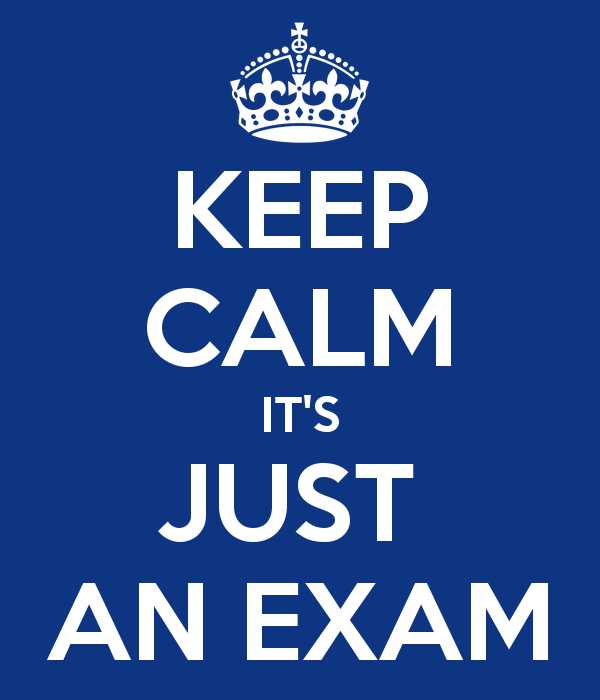
Aren’t all sites, books and newspapers sounding the same a month before your exams? It seems you are their only target to share their wisdom. And you get so overloaded with wisdom that even wisdom begins to stress you.
“We’ve had it enough. As it is we are stressed, and these gyan lecturers are busy distributing their wisdom to us. Why don’t they leave us alone and let us be ourselves? Or even if they want to help us genuinely, give us something we can rely upon. Not these outdated and boring breathing exercises.”
Your reaction is the same, right? Obviously, one would react in such a manner when he is stressed and on the top of it the lectures from family, relatives, and these gyan gurus.
But, nothing of that sort will be dwelt with here. You only have to read on to know.
Study for yourself and to learn
Before discussing the ways to eliminate stress, do you know the full form of EXAMS?
“Examination” would be your answer; however, it is actually “Excitement and Masti with Studies”. Hope half of your stress would be relieved on knowing the exact meaning of exams?
You would be wondering, how exams could mean excitement and masti? Why not? After all, it’s we who have made the examination time a tough and testing one, a time to take stress. Though your parents and teachers have a lot of expectations from you to score well in exams but remember you are not appearing the exam for them, it is for yourself.
If you score well in exams, you will be appreciated by your teachers, parents, and friends. But, if not, they will be the one to scold you and feel annoyed. This means you are appearing in exams to get affection and appreciation from them; your self-esteem and confidence are based on their judgement.
Examination is Excitement and Masti with Studies. When you understand this, half of of your stress would be relieved.
If they approve of you, you feel confident otherwise not. Though it’s normal to have expectations, but, ultimately you study for yourself and not for other’s sake. Your focus for study should be an enhancement in your learning and not just score grades to achieve others’ appreciation.
Remember the character Tyrion Lannister in the series Game of Thrones. Though he is small in size but makes up for his weakness by his high-level intellect. All the more, despite his size, he has a girlfriend.
What does the character display? What message does he want to convey? “Just stop trying to impress people around or care about what they say. Even if you do something cool, they may find reasons to disapprove you.” Similarly, you must not focus on unusual expectations laid by your teachers and parents.
Agreed, today’s schools and parents lay emphasis only on the grades obtained by the student and you can’t change the system. But, at least you can change your perspective towards your studies and exams. Most of the students get stressed at the exam time due to the pressure of expectations by their parents and teachers.
No TV, no phones, no hanging out with friends, no chatting on social media, in short nothing else than books must be your companion during exam time, are the instructions given by most parents.
Revealing his agony about parental pressure, Mayank Srivastava, a 13-year-old boy says that his family dreams about his admission in one of the top colleges of IIT. However, Tushar is least interested in IIT and wishes to gain admission in one of the fine arts college. And by the way isn’t 13 too early an age to think about IIT? At 13 or even 14, 15, 16 one should just be doing two things – playing and Studying. You have only been studying, hence the exam stress.
Such parental pressures are common in every household. Let their expectations be and don’t get overwhelmed by them. Don’t retaliate and oppose your parents openly, but try to talk freely about your desires, capacity to learn and how you wish to proceed with your preparations.
You must study for yourself, keeping your learning process at the centre stage and you will automatically score well in exams. Having an open conversation with your parents and handling their expectations with a calm mind will help them understand your stress and make them supportive in your exam preparations. By remaining silent or accusing them, you would make the matters worse.
At 13 or even 14, 15, 16 one should just be doing two things – playing and studying. You have only been studying, hence the exam stress.
Was that too philosophical? Yeah! It seems to be so, but you need to set a clear goal for your studies; whether it’s just passing an exam or learning something new. Once you proceed with a clear aim, you can make your study time fun and interesting by exploring various ways to learning a concept; rather than just memorising and forgetting it later.
Because once you learn and understand a concept, it will be imbibed in your memory for life and you wouldn’t require an extra effort to remember it. Contrastingly, just cramming and memorising the lessons would give no result. They would be forgotten due to stress and you won’t be able to reproduce them in the examination; further adding to your stress.
Moreover, the approach of the students towards the exam is very cynical. They feel that the schools conduct exams to test their knowledge, but actually, it’s not a test, it’s an opportunity to know your strengths and weaknesses. Exams are a medium where you know your field of excellence and shortcomings related to your studies.
Engage in creative ways to make study time fun and combat boredom
Many students equate effectiveness of their study with the number of hours spent with books. However, it’s not the quantity but quality of time spent reading the book or taking notes that matters. It’s not worthwhile to spend hours with your book and not learning even worth a single penny.
Moreover, learning doesn’t only happen by reading books. Engaging in interactive activities and fun games also makes you learn and retain it for longer. This is how exams become exciting and enjoyable. You learn better by doing it yourself; rather than just reading from the book.
Let’s say you are reading about the Archimedes principle that states “The buoyant force or upthrust exerted on an object partially or completely immersed in water is equal to the weight of the water displaced by the object.”
You would be reading several examples explaining the principle like why does an air balloon float whereas the iron needle sinks in water. And you cram the concept and write exactly the same in your answer paper. But, did you ever try to learn and understand the principle? Ever tried using the principle in your daily life?
Did you know bathing in your bathtub is also dependent on the same principle? That’s why a level is engraved on the bath tub to warn people to avoid filling it beyond that level.
Yes, you might be a champ in memorising things and remembering them, but did you learn anything by simply reproducing it in the exam? This was just one concept, but you have to memorise a number of lessons for the exam and the process gets boring after sometime. You tend to lose your motivation as well.
“People often say motivation doesn’t last. Well, neither does bathing. That’s why we recommend it daily.” Motivation needs to be constant in order to stay upbeat through your exams. Surround yourself with positive and hard-working people that keep you motivated to follow the right approach towards your exams.
Incorporate some fun experiments to learn your lessons, you will learn better and remain motivated to study and explore further. Use your imagination and creativity to think beyond the lines written in the chapter.
For example, while solving a Maths equation, just imagine a situation where you can fit those numbers and arrive at the answer. This helps to escape boredom and makes studying easier and fun.
Sharing his experience, Sena Alkadir from Garfield High School used a simulation of a presidential election to learn and understand the different aspects of elections in an interactive manner. “Although I knew everything about elections, but simulating an actual election helped me to understand better how they work and how do different groups have an influence over an election”, says Alkadir.
Incorporate some fun experiments to learn your lessons, you will learn better and remain motivated to study and explore further. Use your imagination and creativity to think beyond the lines written in the chapter.
Having fun while studying is the reason for the rising trend of studying in groups, where students study, gossip, and enjoy together. After reading a particular topic, you can organise a quiz amongst yourselves to have fun and know how much you have learned and understood the chapter.
Do not keep your exam preparations for the last minute
Preparation for your exams, better to call it learning process needs to be consistent; just like an athlete needs to practice round the year and not only when the competition is near. If you focus on your learning process during regular school hours and while doing your homework the whole year, you need not panic at the time of exams. Examination time can then be utilised for revision of topics or practising your weaker subjects.
Many students argue that regular school hours are so hectic, plus, teachers resort to assigning loads of homework that they are not able to find time for any extra-curricular activities or outdoor games to relax their mind. This further leads to their loss of interest in studying and learning. They just feel like getting through the boring lectures delivered in class and finishing their homework whatsoever.
Sarah, a student in New Jersey remembers one of her experiences in school. Every day her class schedule was the same: read the chapter, complete the worksheets and copy down immense PowerPoints for the rest of the class. The only learning in class was to learn to write fast and continue writing even with hand cramps. “I never really learned anything in that class; I just memorised the information, took a test on it and then forgot everything. Imagine that cycle for an entire year. It was tremendously boring.”
True, the methods of teaching in many schools require students to be seated at their desks for long hours and listen to the lecture delivered. Such one-way teaching fails to maintain the student’s interest in the subject, more so in learning.
If the schools cater to the learning demands of the student and revise their teaching methods to make them interactive, it would benefit the students in the long run. However, you can suggest some ideas for interactive learning in your school because the trend is changing now and schools are open to new ideas and methods of teaching.
Setting an example of a practical approach to learning and its benefits to their students, the Head teacher at Manor Public School, Kate McGee explains how her school utilises practical activities like gardening, cooking, and filmmaking to teach English, Maths, Philosophy and other subjects.
In her opinion, children respond and learn better when engaged in practical activities, rather than reading from textbooks. They grow in confidence if you give them a task to do, which they are able to achieve. And this can be incorporated into teaching the curriculum in an effective, engaging and enjoyable way.
In case you resort to last minute preparations, which though are not advisable, set your priorities for studying a particular topic according to its relevance.
Plus, such learning won’t require continuous revision now and then and students will be better prepared for their exams. It opens their mind to a vast variety of experiences in the subject and raises their chances of success.
However, in case you resort to last minute preparations, which though are not advisable, set your priorities for studying a particular topic according to its relevance. Do not aim at completing the entire syllabus at the last moment; this will create an undue pressure and enhance your anxiety.
Just aim to cover the relevant topics and give your best shot. Amit, a class XII student of Green Fields School, New Delhi shares his story on this. He was a bright student and became a little overconfident of himself. He resorted to last minute studies for his exam thinking he already knows the concept and could make it with little revision at the final hour.
But, to his surprise when he sat down for studies, he realised that he had missed out on many topics and would not be able to cover the entire syllabus for the exam; leading to stress and anxiety. He then recalled the words of his Maths teacher, “If you can’t complete 100% of your syllabus, do it as much as you can, but give your 100% to that little chunk of the syllabus.”
What he meant to deliver through these words was that you must be consistent with your studies and learning throughout the year. Yet, if you feel you can complete only 60% of the syllabus at the exam time, do that 60% sincerely. Aiming for 100% at a short notice only makes you anxious and even that 60% will be lost, leaving you blank and completely helpless.
Be confident of yourself
“A great figure or physique is nice, but it is self-confidence that makes someone really beautiful.”
However, the undue pressure from the teachers and parents and vastness of the curriculum may leave some students with a lack of confidence in themselves. This not only occurs minutes before entering an examination hall but also haunts during exam preparations.
Students carrying books to the examination hall, flipping through pages at the last minute, and biting their nails is a common sight during these months. No, there is no harm to carry a textbook along to the examination hall, but experts recommend relaxing and thinking about happy stuff few minutes before the exam to combat anxiety.
Like you can think about some funny joke cracked by your friend or a comedy scene watched on TV before your exam. The idea is to relax and keep your mind deviated from the obvious anxiety before entering the examination hall.
Don’t let the pressure of your teachers and parents overpower you. Stay calm, have a positive approach towards yourself and your studies, and prepare well. Do not keep anything for the last moment revision just before entering an examination hall.
A great figure or physique is nice, but it is self-confidence that makes someone really beautiful
It’s advisable to review your chapters by organising a question answer session with your friend an evening before the day of the exam. The review helps to test your expertise on the subject, diagnose any flaws that need your attention and build your confidence to face the exam.
Moreover, the more you fear, more you will lose your confidence and more will be the stress. The only way to develop self-confidence is to do the things you fear. If you fear the subject of Maths, sit down and solve some equations, don’t fear whether you will do right or wrong, just do it and gradually you will experience self-confidence and a sense of achievement.
Remember the caption of the soft drink, “Mountain Dew”, “Darr ke Aage Jeet Hai”. It’s not only a caption to market their product, but reflects the truth of life. Until you indulge into doing the task, you won’t learn and won’t develop self-confidence.
Sleep tight and sleep on time
All are aware of the saying “Early to bed, early to rise makes the man healthy, wealthy and wise.” But the recommendation is now taken for granted and students do not pay any heed to it, thinking it to be a fool’s statement.
Though the significance of adequate sleep can’t be ignored even at normal times, examinations are the time to follow the advice more sincerely. Do not stay up late till night for your studies. Prepare your time-table accordingly so that you go to bed at the same time every day. This is in accordance with your body clock that is accustomed to sleeping and eating at particular times.
Any major changes with the routine will have negative effects on your body and mind, further disturbing your concentration and shaking your confidence. A good night’s sleep is essential for your brain to analyse and store the things you have read.
We are not forging into the bad effects of waking late till night; everyone is aware of it. The immediate tiredness and bad mood experienced says a lot about the bad effects of sleeping late at night. You not only have to sleep early but, also consider the daily sleeping routine which must be consistent.
Never go to bed reading a chapter or solving some heavy maths equation; your mind tends to reconcile on those things during sleep and you do not get complete rest. It is advisable to listen to some soft instrumental music or read a motivational story before going to bed.
What majority students do is wake up till 2-3 am at night romancing their textbooks and sleep late in the morning to cover up on their sleep. Either they wake up late wasting most part of their day or feel tired after rising. Have you ever realised what impact will this have on your concentration?
And then you blame the vast syllabus for your anxiety. It’s not the syllabus alone, rather your approach towards it that makes sense. You can either plan and maintain a balance between your health and studies or just keep on studying like an owl.
Moreover, staying awake till late hours on the day just prior to your exam is all the more harmful. Go to bed early on that day and wake up 15-30 minutes prior to your usual waking time so that you can get ready for the exam on time.
The correct method of study
Normally, students just cram their chapters and feel they are done with their preparation. But, when it’s time to write in an answer paper, they just go blank and are unable to recollect the answer.
To avoid this, it’s important to always take down the things you read in your own writing so that you remember them for a longer period of time and enhance your learning. The common habit of students is to highlight the major points in a chapter with a special pen and then keep on memorising it for hours.
No doubt highlighting the important points does serve your purpose of paying attention to the chunk of information from a pool of knowledge. Yet, writing down things in your own language reiterates the concept in your mind and you understand and retain for longer.
For example, while learning about the important dates of a historical event, you can create a small table highlighting the event with its date, so that you can just have a look at the gist of the information while revising the chapter.
Stressing the importance of writing your own notes, Nehmat Mongia, a student of Modern School, Barakhamba who scored more than 95% in her board exams said, “I used to write and rewrite everything I studied. I did so not for studying or remembering before the exams, but to understand things and it was as if only I could teach myself. I did just that and made studying a fun activity.”
Moreover, the place of your study has a deep impact on your concentration and ability to grasp your concepts. You have different sites mentioning the amount of light, the things to keep at the study table and to study only on the chair while preparing for your exams.
But, do you know how your study table and chair must be inclined? Many students are seen either slipping down into the chair or bending their necks down for long hours at studying. Your study table and the chair must be so designed that your neck remains straight while studying and your feet touches the ground while sitting.
How is posture related with exam stress? Not directly, but a bad posture while studying tends to hurt your neck and back muscles making them stiff. To attain maximum concentration while studying, you not only need a healthy mind but, also a healthy body.
If you are sick or suffering from pain anywhere in the body, you won’t be able to concentrate on your studies and would panic with anxiety.
Significance of a healthy diet during exams
The significance of a healthy diet can’t be overstressed at this hour. Many students believe in spending hours at their study table to prepare for their exams and in an extreme state give up eating proper meals and indulge in eating only fruits. They hold the opinion that eating much will make them feel sleepy and disturb their study routine.
But, actually, they don’t realise that eating well during exams is more crucial than at any other time. Avoiding meals to prevent falling asleep afterwards is not the solution. You must prepare your study routine to take time out for your breakfast, lunch, and dinner. This not only provides you with necessary nutrition but relaxes your mind from the burden of studies.
Sleepiness after a meal is mostly encountered if you consume food products with high amounts of fat like chips, fried products and so on. Keep your meals healthy and devoid of transfat and sugar to avoid feeling drowsy. In case you feel lethargic after a meal, listen to some instrumental and lively music for few minutes before sitting down for your studies.
“My appetite is dead. I don’t feel like eating anything. If I eat something, I will vomit.” These are the excuses commonly heard by the students during their exams. It happens because they think more and worry more about their performance in exams.
As the saying goes, “Fools worry, and wise prepare”, so it’s obvious you don’t want to behave like a fool at this hour. Eating the right thing at the right time is the secret behind healthy body and mind. Not only nutrition but what you eat can help you cope with your exam stress.
All the more, you can make meal time a learning time too. Have a look at the vegetables cooked for your lunch and dinner and try to memorise the vitamins and minerals you receive from them. Learning in this manner is fun and doesn’t create a burden on you for memorising the facts.
“Fools worry, and wise prepare”, so it’s obvious you don’t want to behave like a fool at this hour.
Eat smaller and frequent meals and avoid large meals at this time, as they tend to make you drowsy. Green vegetables, fruits like strawberries, amla, oranges, tomatoes, and whole grain cereals like oats, barley, and whole wheat are a must in your diet regime. For the non-vegetarians, eggs and lean meat provide the necessary memory boosting nutrients.
Treat water as your best friend in the examination days. However, do not keep a water bottle or a plate of snacks near your study place. This ensures that you get up and take a minutes’ walk around the house whenever you feel thirsty or hungry in between; breaking away from the sedentary routine of studying and relaxing your mind every few hours.
Take in these words with full attention. Do not take tea, coffee or other caffeinated drinks at this stage. Many students take tea or coffee to help them stay awake till late in the night for their studies or to avoid sleepiness in between. But, such things do more harm than good.
Instead, if you feel sleepy, munch on some healthy snack like a vegetable sandwich or have a glass of water or take a walk outside in fresh air to refresh your mood and take a break from the study routine.
Do not compare yourself with your peers
Many students have a habit of discussing with their friends as to how many topics they have covered for the exam. There is nothing wrong with this custom till it keeps you motivated to prepare well for your exams.
However, if you start a comparison of yourself with your peers and look down upon yourself, the habit needs to be restricted. Every student has his own aptitude and pace of learning, even you have your own.
If you wish to discuss any doubt with your friends or plan an interactive quiz to check your knowledge, the conversation will be fruitful and rewarding for your learning and motivation. But, discussing and comparing yourself with others may have a negative impact on your confidence level.
If you feel that you are not confident enough and talking to your friends further demoralises you, stop indulging in such conversations before and during the exams. Even after completing the examination paper, do not discuss the answers with your peers. Be confident of your preparation and move ahead with any flaws you might discover therein.
Just remember, you are in competition with no one; just with yourself. If you find yourself better than yesterday, you achieve your goal. In fact, this trend of competition that has gripped our society today is more destructive than constructive for human minds.
Everybody is focusing on becoming better than the rest but no one focuses on being better than what they were yesterday; a notion that has led to a blind competition and stress in individuals. They never try to learn a new skill and be better equipped than yesterday, but wish to be ahead of others.
A scene in the Bollywood film 3 Idiots reminds us of this valuable theory of learning and not comparing with others. When Aamir khan was explaining the correct method of teaching to Boman Irani by using two useless words, he stressed the importance of learning and not paying attention to coming first or second in the class.
No one will pay attention to your class rank later in life, but how you perform today is what matters . And comparing yourself to others doesn’t make you learn, only increases your pressure and stress for the studies.
Do not underestimate yourself by comparing yourself with others. After all, it’s these differences that make us unique and beautiful. So, respect your differences with others and utilise them for your exam preparation.
Instead of comparing, leverage these differences in learning and propelling each other forward in exam preparations. For example, if you are good at algebra and your friend excels at vocabulary, you both can help each other with your respective weaker fields.
Pursue your hobbies even during exams
No fun, no chatting, and no shopping. This is the notion carried by most students during their exams. If not, it will be stressed by your parents; a big NO to everything. “Forget your mobile phones for few days, forget there is any cable connection in the house till your exams are over”, says your father.
Though some of these things prove to be distracting from your studies, but, giving them up completely is not advisable. You can’t sit glued to your chair for the whole day peeping into your textbooks; your mind needs to de-stress and relax in between, but the pressure from your parents doesn’t let you indulge in them.
However, it depends upon you how you use these mediums; only in moderation to relax your mind or become completely distracted from your studies. If you use them in moderation at particular times to break free from the sedentary routine of studying, no parents would pose an objection.
In fact, many parents encourage their children to engage in their hobbies or favourite pastime even during exams to help them de-stress their minds. As said before, exams are not punishing times, but, an opportunity to test your knowledge and know your strengths and weaknesses. So, why change your routine during the exams, why drift apart from your hobbies?
M. Gayathri, the All- India CBSE topper of the year 2015 pursued her hobbies even during the board exams as she revealed to a The Hindustan Times reporter. Talking about her relaxing tip, she added “Unlike others, I did not discontinue my hobbies during the exams. In fact, singing and painting helped me to de-stress during that time.”
What can be inferred from her experience is that stress is common and obvious during examination time. However, do not let stress overpower you, simply find ways to cope with it, just like Gayathri did by engaging herself in singing and painting.
Yet, another trend seen amongst students is planning for their exam preparation in advance. No doubt, we do advise to plan out a timetable for studying, exercises, meal time, and relaxation. But, how should you go about these plans is the main catch?
Do not plan your entire preparations for the month or a week at one go, but go about planning each day step by step. If you plan for the entire week or month, chances are high that you won’t be able to stick to them and get demotivated and stressed in return.
Contrastingly, planning for each day step by step keeps you motivated and rewards you with a sense of achievement at the end of the day. Indulge in giving yourself a treat when you accomplish your task every day.

Sukriti Gupta, the All-India CBSE topper of the last year doesn’t believe in excessive planning for the exams but taking one step at a time. She further advises other students preparing for their exams to follow NCERT books strictly, not fall into the trap of studying for 14 hours a day and not to expect any last minute miracles.
She further owes her success to the regular routine she followed, be it for her studies, diet regime or exercises.
There is no short-cut to success; hard work and consistency in your preparations is the only key.
You may like
-


Questioning the Trend of Lavish Farewells- #FarewellFiasco
-
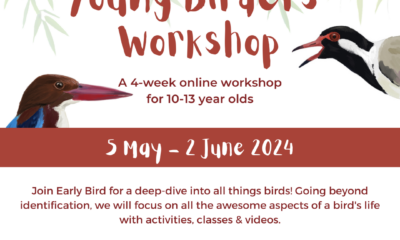

Young Birders’ Workshop Opens Registration for Children Aged 10-13 Years
-
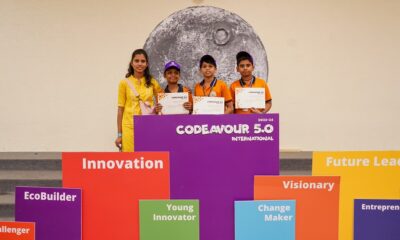

STEMpedia Successfully Completed Codeavour 5.0- India’s National Innovation Fest
-


Reviving School Education: Countering the Coaching Centre Dominance
-


CBSE to Initiate Pilot for National Credit System in Grades 6, 9, and 11
-


The Role of Marketing in Education: Navigating the New Educational Landscape
-


From Overwhelmed to Empowered: Strengthening Educator Skills for Success
-
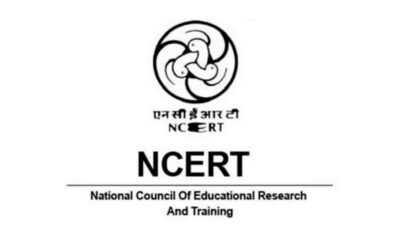

NCERT Introduces Bridge Month Programme for Class 6 Amid Textbook Transition
-


Indian Embassy Advocates for India-US Collaboration in Education Sector
-


Nurturing Healthy Behaviors: The Role of Schools in Shaping Health-Conscious Citizens
Knowledge
Young Birders’ Workshop Opens Registration for Children Aged 10-13 Years
Published
3 days agoon
April 16, 2024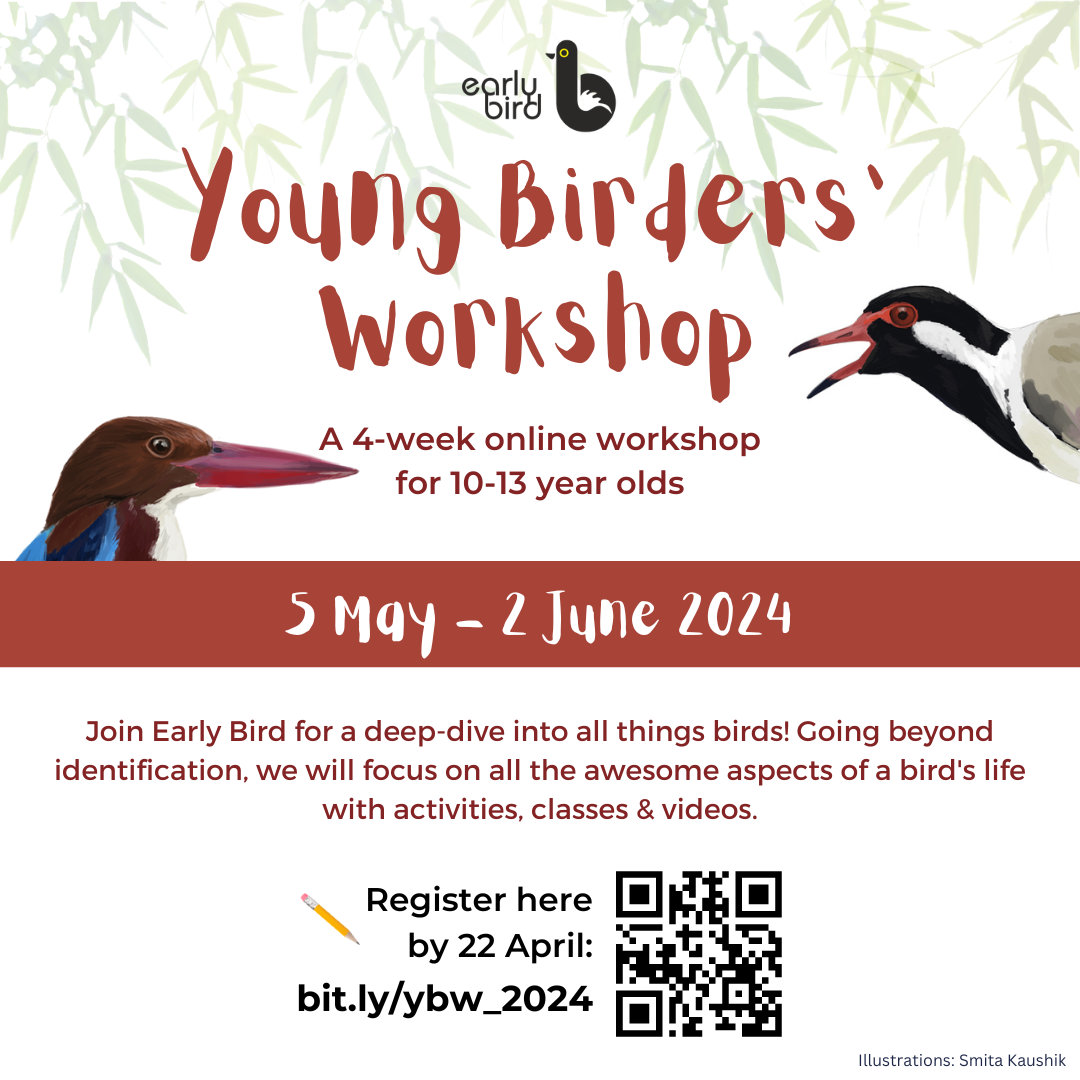
Early Bird, a not-for-profit initiative by the Nature Conservation Foundation, has announced the launch of an online birdwatching workshop tailored specifically for young enthusiasts aged 10-13 years. As birdwatching gains popularity across India, Early Bird aims to deepen young birders’ understanding of their natural surroundings, beyond merely ticking off bird names from their lists.
Set to commence during the summer holidays, this 4-week intensive programme will explore various themes through online sessions that combine multimedia, guided interactions, and lively discussions. These weekly live sessions will be held on consecutive weekends, each supplemented by an illustrated activity sheet that encourages participants to engage with and observe the green spaces around their homes.
The workshop is designed not only to educate but also to foster a deeper appreciation and awareness among children of the ecosystems they inhabit. “The workshop has changed our lives so much. We have found around 30 bird varieties around our house which we were completely unaware of,” shared Rupinder Kaur, a parent of a participant from previous workshops.
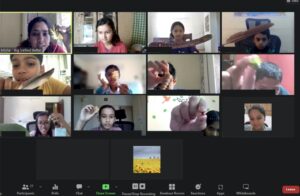
“My son never journaled or made notes. Now, he has started noticing everything when we go out to walk and wants to carry his journal. He has always hated writing but now carries his book and pencil and is ready to make notes. This workshop has made a difference to the way he looks at things. Quite enlightening. Has a lot to ask and share.“ said another participant’s parent.
While the workshop itself is free to attend, there is a nominal fee of Rs. 800 for materials, ensuring that all participants have access to the necessary resources to fully benefit from the experience.




Registrations for the workshop are now open and can be accessed through the link provided here. This initiative aims to be an enlightening experience, allowing young minds to discover and connect with the biodiversity that exists right in their backyards.
Early Bird continues to dedicate itself to bringing children closer to nature through educational content, training educators, and direct outreach, fostering a new generation that values and conserves our natural world.
Education
The Role of Marketing in Education: Navigating the New Educational Landscape
Published
1 week agoon
April 10, 2024
In an increasingly competitive and interconnected world, the concept of marketing, once synonymous with businesses and industries, has found its place within the realm of education. As educational institutions vie for attention amidst a cacophony of voices, the need for strategic marketing and public relations (PR) efforts has become paramount. While the moral implications of marketing in education may spark debate, there is a compelling argument for incorporating marketing concepts into the educational curriculum, equipping students, teachers, and parents with the knowledge and skills to make informed decisions in an ever-evolving educational landscape.
Gone are the days when educational institutions relied solely on their academic prowess to attract students. In today’s digital age, where information is abundant and attention spans are fleeting, the ability to cut through the noise and communicate effectively has become a prerequisite for success. From crafting compelling brand narratives to leveraging social media platforms, educational institutions are embracing marketing strategies to enhance their visibility and appeal to prospective students and stakeholders.
However, the incorporation of marketing into the educational sector extends beyond mere promotional efforts. At its core, marketing is about understanding the needs and preferences of your target audience and delivering value accordingly. By teaching marketing concepts to students, educators empower them with critical thinking skills and an understanding of consumer behaviour, enabling them to navigate the complex marketplace of ideas and opportunities.
Moreover, marketing education goes beyond the classroom, extending its reach to teachers and parents alike. Educators, tasked with shaping the minds of future generations, can benefit from an understanding of marketing principles to engage students more effectively and create meaningful learning experiences. Similarly, parents, as key stakeholders in their children’s education, can make more informed decisions about school choice and educational resources by understanding the marketing strategies employed by educational institutions.
Critics may argue that the commodification of education undermines its intrinsic value and fosters a culture of competition at the expense of collaboration. While these concerns are valid, it is essential to recognize that marketing, when approached ethically and responsibly, can serve as a powerful tool for positive change. By promoting transparency, accountability, and accessibility, marketing can help bridge the gap between educational institutions and the communities they serve, fostering a culture of trust and mutual respect.
The integration of marketing concepts into the educational curriculum represents a paradigm shift in how we approach education in the digital age. By equipping students, teachers, and parents with the knowledge and skills to navigate the complexities of the modern educational landscape, we empower them to make informed decisions and drive meaningful change. As we embrace the potential of marketing in education, let us remain mindful of its ethical implications and strive to harness its power for the greater good.
Education
From Overwhelmed to Empowered: Strengthening Educator Skills for Success
Published
1 week agoon
April 10, 2024
In the corridors of any classroom, teachers stand as pillars of guidance, tasked not only with imparting knowledge but also with nurturing the holistic development of their students. However, the onerous burden of managing a multitude of responsibilities within resource-constrained environments poses a formidable challenge, underscoring the urgent need for enhanced teacher training programmes.
At the heart of this challenge lies the staggering class sizes prevalent in Indian schools. With classrooms often overflowing with 35 or more students, the task of catering to diverse learning needs while maintaining order can seem insurmountable. Effective classroom management techniques, tailored to accommodate large cohorts, are essential for fostering a conducive learning environment and mitigating stress for both teachers and students.
Moreover, the complexity of the modern educational landscape necessitates a multifaceted approach to teaching. From addressing academic gaps to promoting socio-emotional well-being, educators are expected to wear multiple hats, often without adequate training or support. Enhanced teacher training programmes must equip educators with the pedagogical tools and strategies necessary to navigate this intricate web of responsibilities effectively.
Central to the need for better teacher training is the imperative of managing workload and stress. The relentless demands of completing the curriculum, crafting assessments, and addressing administrative tasks can take a toll on educators’ mental health and overall well-being. By providing teachers with comprehensive training in stress management techniques, time management strategies, and self-care practices, we can empower them to strike a balance between professional duties and personal wellness.
Addressing the point of the topics that should be touched upon, these teacher training programmes must encompass modules on effective assessment practices and differentiated instruction. By equipping educators with the skills to design assessments that cater to diverse learning styles and abilities, we can ensure that every student receives the support they need to thrive academically. Similarly, training in differentiated instruction enables teachers to tailor their teaching methods to meet the individual needs of each student, fostering a more inclusive and equitable learning environment.
In addition to addressing immediate challenges, enhanced teacher training programmes must also focus on future-oriented skills and competencies. With rapid advancements in technology and pedagogy, educators must be prepared to adapt to changing educational landscapes and embrace innovative teaching methodologies. By providing training in digital literacy, collaborative learning, and project-based instruction, we can empower teachers to harness the potential of emerging technologies and create engaging learning experiences for their students.
Ultimately, the need for better teacher training is not merely a matter of professional development; it is a moral imperative. By investing in the growth and well-being of educators, we invest in the future of our nation. Because one teacher’s well-being will lead to the well being of those 35 other kids in a classroom.
Education
Nurturing Healthy Behaviors: The Role of Schools in Shaping Health-Conscious Citizens
Published
2 weeks agoon
April 7, 2024
In the landscape of education, schools play a pivotal role far beyond the realms of academic learning; they are instrumental in moulding the future of our society by nurturing health-conscious citizens. This World Health Day, as we embrace the theme ‘My health, my right’, it’s crucial to spotlight the impact of school programs and policies in fostering healthy lifestyle choices among students. This endeavour not only aligns with students’ rights to education about health but also paves the way for a healthier, more informed generation.
In India, where diverse cultural backgrounds and socioeconomic statuses often dictate one’s access to health education and resources, schools have a unique opportunity to bridge these gaps. The Midday Meal Scheme, one of the largest school nutrition programs globally, serves as a sterling example. By providing nutritious meals to children in government and government-aided schools, it aims not just to combat hunger but to promote nutritional education and healthy eating habits among young learners. This initiative directly impacts the health and educational outcomes of approximately 115 million children across the country, showcasing the powerful role schools can play in shaping health-conscious behaviours.
Furthermore, the Government of India’s Rashtriya Kishor Swasthya Karyakram (RKSK) program emphasizes the importance of adolescent health, targeting the 253 million adolescents in the country. RKSK aims to integrate health education into schools, covering critical areas such as nutrition, mental health, and substance misuse, thereby ensuring that young individuals are equipped with the knowledge and skills to make informed health decisions.
However, the journey doesn’t end with national programs. Individual schools across India are taking innovative steps to encourage healthy behaviours. For instance, several institutions have introduced yoga and meditation into their daily routines, recognizing the importance of mental well-being alongside physical health. These practices not only improve students’ concentration and stress management skills but also instill a lifelong appreciation for holistic health practices.
Moreover, environmental health has become a growing concern, with schools incorporating lessons on sustainability and the importance of preserving our planet for future generations. Initiatives like setting up organic gardens, recycling projects, and awareness campaigns on water conservation are becoming increasingly common, fostering an eco-conscious mindset among students.
Despite these strides, challenges remain. Access to quality health education and resources is not uniform across India’s vast and varied landscape, with rural and underprivileged communities often at a disadvantage. Addressing these disparities requires concerted efforts from policymakers, educators, and communities to ensure that every child, irrespective of their background, has the right to health education and the opportunity to grow into a health-conscious citizen.
As we observe World Health Day, it’s clear that schools are much more than places of academic pursuit. They are crucial battlegrounds in the fight for a healthier future, where informed, conscious choices are not just encouraged but ingrained. By continuing to develop and implement comprehensive health education programs, schools can truly honor the theme ‘My health, my right’, turning it from a vision into a reality for every student across India.
Knowledge
Sharing the spotlight: When parent and child take board exams together
Published
2 weeks agoon
April 5, 2024
Board examinations are a kind of pressure cooker that often isolates kids and forces them to fight anxiety and expectations on their own. But picture yourself starting this important journey with your own parents, both of you aiming for academic success. This unconventional path, where parent and child become fellow students, unfolds a captivating narrative of shared aspirations, mutual support, and an inspiring exchange of motivation.
A Symphony of Support: Parent and Child, Hand in Hand
Consider the board exam season as a collaborative experience rather than a solo battle. For families in which both parents and children assume the risk together, that is the truth. A potent synergy is unlocked by this singular situation: unshakeable inspiration and reciprocal motivation. When a parent sees their child’s burning ambition, their own hidden aspirations are reawakened. Because of their common experience, they are able to provide advice based on practical knowledge, and the child’s enthusiasm turns into a motivating factor that others find infectious. In response, the child gets much encouragement. The parent becomes a study buddy, a champion in their corner, and a living testament to the fact that learning knows no age limit. This fosters a safe space for vulnerability, where anxieties are shared and triumphs celebrated with genuine empathy.
There are some people who serve as inspiration. Together, they disprove limiting notions and demonstrate that ambition has no boundaries. Their story becomes a beacon for others, inspiring them to follow their dreams and cherish lifelong learning regardless of age. This collaborative effort is about more than just grades; it’s a symphony of a support system where motivation becomes a team effort and rewards are shared. Their achievement is evidence of the transforming power of familial relationships, as they take center stage not as rivals but as comrades. Their tale will have an impact well beyond the exam room, encouraging others to start their own educational and personal development journeys alongside the people they care about.
Shared Spotlight, Separate Journeys: Finding Balance
Although there is no denying the advantages of parent-child board exam experiences, managing shared stress calls for skill. However, managing personal aspirations and expectations can be challenging. Children may feel that their own goals are overshadowed by comparisons, and parents may find it difficult to avoid them. Keeping distinct identities becomes essential.
Practicing healthy boundaries enables success. Create dedicated study spaces, cultivate individual interests, and prioritize open communication. Recall that you are allies, not competitors. Respect each other’s unique paths and celebrate accomplishments. Growth is the focus of our shared journey, not grades, and it can only be achieved by respecting each other’s unique personalities.
The Rewards of a Joint Journey
Teenagers are frequently isolated on the board exam battlefield, forced to deal with challenges on their own. But imagine overcoming this obstacle with your parent by your side, experiencing triumphs and setbacks together. This collaborative approach opens up a wealth of benefits that go beyond personal accomplishments.
Each win becomes a collective celebration, etched in memory as a testament to shared effort. High fives after acing mocks, celebratory dinners after stellar results – these moments weave a tapestry of familial joy. On the other hand, failures present chances for mutual empathy. Late-night chats of support following a challenging test, words of encouragement following a low score—these mutual setbacks strengthen the network and create a lasting connection.
More than just academic results, this journey deepens family connections. Study sessions that last into the night become personal discussions that promote trust and open communication. Together, overcome obstacles strengthen the base of compassion and understanding, fostering an environment that is secure for open communication and vulnerability. This improved communication goes beyond the board exam experience and becomes an important life skill.
Ultimately, this shared endeavor is about more than just academics—it’s about creating lasting experiences, strengthening bonds, and promoting deeper dialogue. It’s a journey that makes an enduring imprint, a constant reminder that group accomplishments and the transforming power of support can result in bigger rewards than individual ones.
A Story Beyond Exams:
This is ultimately a story not just of exams and scores, but of a shared adventure in learning, growth, and unwavering support. It is proof of the power of inspiration and motivation, demonstrating that no matter our age or situation, we can reach our goals as long as we walk hand in hand with the people we love. Together, their spotlight emphasizes their personal journeys, the transformative power of familial bonds, and the limitless opportunities that present themselves when we choose to develop, learn, and dream together.
Authored By:
Tushar Chaudhari,
Executive Director,
Target Publications Pvt. Ltd.
Education
The Potential of an Entrepreneurial Development Programme for Primary School Students
Published
2 weeks agoon
April 2, 2024
Educators will find great value in discovering the potential of an Entrepreneurial Development Programme tailored for primary-grade students. Such a program aims to equip young learners with essential skills, mindset, and knowledge crucial for navigating an ever-evolving world. Participating in an Entrepreneurial Development Programme not only aids primary-grade students in developing life skills but also enhances their academic performance, laying a robust foundation for their future endeavors and personal development. Schools should explore how an entrepreneurial development programme can transform and help students reach their full potential by teaming up with education providers who specialize in this area.
Advantages of Entrepreneurial Development Programme for Young Students
In today’s fast-paced world, traditional educational methods alone may not adequately prepare students for future challenges. Entrepreneurial development programme designed for primary-grade students offer a host of benefits beyond conventional classroom learning.
First and foremost, these programs foster creativity and critical thinking skills in young learners. By presenting real-world problems and encouraging out-of-the-box thinking, such initiatives stimulate imagination and promote innovative problem-solving, thereby enhancing academic performance and imparting valuable skills applicable across various domains of life.
Furthermore, entrepreneurial development programme cultivates teamwork and collaboration skills essential for success in an interconnected world. Through group activities and projects, students learn effective communication, collaboration, and leveraging each other’s strengths, crucial not only for academic achievement but also for future professional endeavors.
Moreover, these programs instill a strong work ethic and sense of responsibility in students by engaging them in hands-on activities and practical exercises, providing firsthand experience in project management, decision-making, and problem-solving. Such experiences foster accountability and ownership, qualities vital for future leaders and entrepreneurs.
Participation in an entrepreneurial development programme also boosts self-confidence and resilience among students. By undertaking entrepreneurial activities and confronting challenges, students learn to believe in their capabilities and develop the resilience to overcome obstacles.
Additionally, these programs nurture leadership qualities by offering opportunities for students to take charge and lead peers, thereby developing the skills and mindset necessary for effective leadership.
Entrepreneurial skills promote a growth mindset, encouraging students to view failure as a learning opportunity and persist in the face of challenges, fostering a belief in their capacity to grow and improve is essential for navigating the uncertainties of the future.
Key Components of an Effective Entrepreneurial Development Programme
- To ensure the effectiveness of an entrepreneurial development programme for primary-grade students, several key components must be in place. Firstly, the program should have a structured curriculum covering various entrepreneurial topics, designed to be engaging and age-appropriate, with activities that inspire and challenge young learners, and should be continuous rather than sporadic workshops.
- Hands-on learning experiences should be integral to the program, allowing students to apply their knowledge and skills to real-world challenges, and fostering a deeper understanding of entrepreneurship.
- The involvement of mentors and industry professionals provides students with valuable perspectives, guidance, and inspiration, enhancing their learning experience.
- The program should include opportunities for assessment and self-reflection, empowering students to track their progress and take ownership of their learning journey.
- Finally, students should have the opportunity to document their projects, enabling them to showcase their ideas and experiences through e-portfolios.
Implementation of an Entrepreneurial Development Programme in Schools
Implementing an entrepreneurial development programme in schools requires careful planning and coordination. Key steps include researching and understanding the program, creating a clear vision aligned with the school’s mission and values, securing buy-in from stakeholders, forming a dedicated implementation team, providing comprehensive training and professional development, adapting the program to suit the school’s specific needs, setting clear goals and metrics, integrating the program into various aspects of school life, continuously evaluating its effectiveness, celebrating successes, ensuring sustainability, and staying connected with the broader entrepreneurial community for ongoing support and inspiration.
Entrepreneurial Development Programme for Primary-Grade Students
Kidspreneurship serves as exemplary models of the impact these initiatives can have. Kidspreneurship, an education service provider from Singapore, offers meticulously designed curricula, real-world challenges, industry mentorship, holistic assessment, and opportunities for students to develop e-portfolios, empowering them to become future leaders and entrepreneurs.
Headquartered in Singapore, Kidspreneurship works with schools globally to offer a high-quality plug-and-play platform and implementation support that allows schools to integrate entrepreneurship in their curriculum.
According to Swati Gauba, the Thinker in Chief and Founder, emphasis is placed not only on top-notch content and technology but also on execution, ensuring a stellar experience for educators and students alike while measuring impact at every stage of the implementation process. Click to know more about Kidspreneurship Programme for Schools
Edutainment
World Theatre Day: Let Theatre Arts Make Classroom’s Showtime Spectacular!
Published
3 weeks agoon
March 27, 2024
As we roll out the red carpet for World Theatre Day, celebrated every year on March 27, let’s shine the spotlight on the dazzling world of theatre arts in education—a realm where creativity knows no bounds, and every student gets a backstage pass to explore the endless facets of their personality. Theatre arts isn’t just about taking a bow on stage; it’s a grand production that includes acting, scriptwriting, directing, set design, costume creation, and even the magic of lighting and sound effects. It’s where the shy kid in class becomes a roaring lion, and the daydreamer directs their first masterpiece.

Diving into the eclectic mix that is theatre arts, students embark on a thrilling adventure into storytelling, embodying characters from realms far and wide. But wait, there’s more! Ever fancied crafting a world from scratch? Set design and costume creation offer a canvas for the wildest imaginations, turning dreams into tangible realities. And for the tech-savvy, lighting and sound effects provide the perfect playground to amplify the drama or set the mood. It’s like being the wizard behind the curtain, where a flick of the switch can transport the audience to another dimension.
But theatre arts in schools is more than a ticket to the creative Olympics; it’s a masterclass in life itself. Through the laughter of improvisation and the discipline of rehearsals, students learn the art of expression and the power of voice. Theatre teaches us to walk in others’ shoes, sparking empathy and understanding in a performance that extends beyond the stage and into the corridors of daily life.
And let’s not forget the standup comedians, the jesters of the modern age, who wield humour like a sword, cutting through tension and bringing light to the darkest rooms. Standup comedy, an exhilarating facet of theatre arts, schools students in the art of storytelling and the bravery of vulnerability, proving that sometimes, laughter truly is the best medicine.
Integrating theatre arts into the curriculum is like adding a pinch of magic to the mundane, transforming the classroom into a space where learning is an adventure, not a chore. It’s where students can be themselves (or someone else entirely) in a judgment-free zone, discovering their potential and pushing boundaries, one act at a time. Schools that embrace theatre arts offer students a safe space to explore their identities, confront societal issues, and express themselves authentically. Through theatre, students learn the importance of voice and agency, discovering their capacity to effect change in their communities and beyond.
So, as we celebrate World Theatre Day, let’s champion for theatre arts to take centre stage in schools. After all, in the grand theatre of life, we’re all players, and what better way to prepare for the world’s stage than by embracing the creativity, collaboration, and sheer joy of theatre arts? Here’s to the scriptwriters, the directors, the set designers, and the stars of tomorrow—may your light shine bright, both on and off the stage.
In the immortal words of Shakespeare, “All the world’s a stage,” and it’s high time we all play our part, ensuring that the wonders of theatre arts are not just an act, but a fundamental chapter in the story of education.
Education
Post-pandemic: Embracing Well-being in India’s Schools with My Guide Inside
Published
4 weeks agoon
March 21, 2024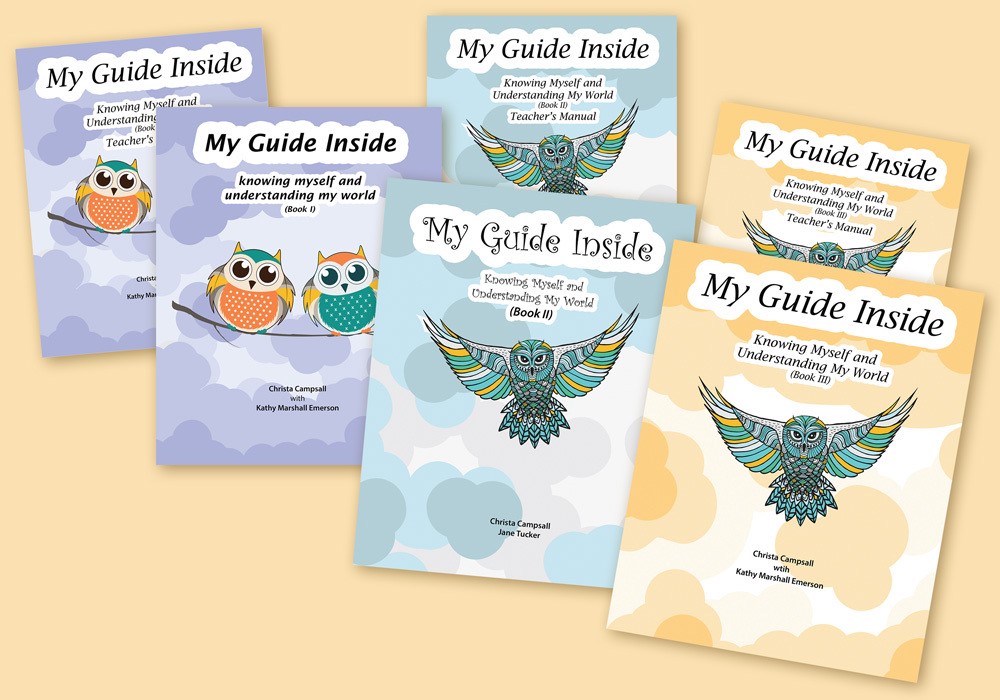
My Guide Inside (MGI is a three-part, comprehensive, story-based well-being curriculum; it brings out the best in all learners. Students and adults who learn they operate from the inside-out report My Guide Inside principles change their lives. MGI Online classroom learning platform is created locally for Indian children and youth.
The History of MGI
The pandemic ended the trajectory of our education “world.” Full stop. We had completed My Guide Inside (MGI) classroom pilots but school abruptly pivoted to online and plans to implement MGI halted.
Silver Linings for MGI
Worldwide we became comfortable with Zoom and discovered that one’s humanity comes through. We met colleagues in the global community and confirmed MGI is a universal curriculum—beyond beliefs and culture. It became apparent that students were struggling to be isolated while learning online. In support of their well-being, we created Video on Demand (VoD) to enhance the MGI chapters. Now we see that VoD also supports English Language Learners. We had completed My Guide Inside face-face professional development series. Now we shifted the MGI series to be self-study online with opportunity for group discussions– accessible for free in any global community. Educators benefit from this professional learning and as a result are able live, learn and confidently share these profound MGI lessons.
3 Year Official Focus Group Report
MGI students from 2018 and 2021 were asked about MGI and a report was prepared. This report provides hope that there is a path to well-being even in challenging times.
Bonnie states, “The MGI principles are so universal and definitely ingrained just in a way that I live my life that, I almost don’t even need to go back and reflect specifically because it’s something that applies to every aspect of my reality.”
Lina states, “I think something I realized for myself during the pandemic is I gained focus… I think some other people I know and I care about deeply might not have had that same shift of focus … which I fully understand, and I have compassion for as they might not have had the same education as I had through My Guide Inside, so I’m very grateful…”
Connection with India
It’s always an honor to connect with Sandeep Dutt, Founder of Learning Forward India Foundation and the Good Schools Alliance (GSA). (Sandeep, Sir, and I met through HundrED, a global education innovation organization.) There’s an understanding that well-being is a foundation for success in all life’s domains. MGI is a GSA learning partner. We conducted our first online MGI professional development series with GSA educators.
Sukhpreet states, “I learned about consciousness. That is the biggest thing which I now am able to relate everything to when I’m teaching; I can help my students. This self-realization and again the discussions we had were wonderful … that’s the beauty of the MGI sessions.”
After meeting with local advisor, Jugjiv Singh, we determined to create MGI Online with Hindi vocabulary. MGI Online I, II, III for young kids, kids, and teens were expertly created by Jishnu Gupta and Supratim Kar at edTree. The pilot for MGI Online Book III with GSA student interns proved to be a rich ground for learning and sharing the MGI principles. The youth determined to continue! They showed tremendous leadership and became MGI student mentors in their school’s Life Skills 4 and Life Skills 9 courses.
Yashraj states, “I love these MGI sessions … What I have gathered from all of this is not dwelling in the past and that mind thought, and consciousness makes our reality, which we face now.“ His parents note, “Yashraj has been able to articulate his ideas in a more effective manner and proving to be a better orator with each passing day. His pressure handling skills have remarkably improved. We are seeing a paradigm shift in his approach towards day-to-day activities. This MGI program has been an excellent blend of cross-cultural learnings which are beyond local boundaries.”
Globally, and significantly in India, we are seeing the focus on well-being is necessary for our children and youth to experience success, especially post-pandemic. MGI Online principles align with the National Curriculum Framework (NCF) 2023: Well-being of individuals remains crucial for success in all aspects of life.
My Guide Inside principles benefit learners: mentally, behaviorally, academically, and socially. MGI is not prescriptive, it is descriptive, empowering youth “inside-out.” MGI principle-based “understanding” is a solid foundation for navigating our rather complex, beautiful world.
Authored By-
Christa Campsall,
Co-Author, My Guide Inside
Education
The Intersection of Happiness and Technology in Education
Published
1 month agoon
March 20, 2024
In today’s fast-paced world, the quest for happiness has taken a front seat in discussions about education. The International Day of Happiness, celebrated on March 20th, offers a perfect moment to reflect on how technology, often seen as a double-edged sword, can actually foster happiness and well-being within educational settings. For educators and stakeholders in the Indian education system, understanding this intersection opens avenues to create more inclusive, engaging, and mentally stimulating environments for students.
The digital era has transformed traditional educational paradigms, introducing tools that not only facilitate learning but also enhance the mental and emotional well-being of students. The integration of technology in education, when done thoughtfully, can lead to a harmonious balance between academic achievement and happiness. This balance is crucial in the Indian educational context, where the pressure to perform academically often overshadows the importance of mental health.
One of the most significant ways technology contributes to happiness in education is through the personalisation of learning. Digital platforms enable learners to progress at their own pace, explore their interests, and engage with content that resonates with their individual learning styles. This personalisation fosters a sense of autonomy and competence, key components of intrinsic motivation and happiness. Apps and online platforms offer interactive and gamified learning experiences that make education not just a task, but a joyous journey of discovery. The result is a more engaged and satisfied student body, eager to learn and less prone to the stress and burnout associated with traditional rote learning methods prevalent in many Indian schools.
Moreover, technology bridges the gap between the educational needs of diverse learners, including those with special needs, by providing accessible learning tools and resources. Digital accessibility tools such as speech-to-text software, interactive eBooks, and customisable learning interfaces ensure that every student has the opportunity to learn in a way that best suits their needs, promoting inclusivity and thereby enhancing overall happiness.
In addition to facilitating personalised and inclusive learning, technology plays a pivotal role in promoting positive mental health among students. Digital mindfulness and well-being apps have become increasingly popular in educational settings, offering guided meditations, breathing exercises, and stress management techniques. These resources are particularly valuable in the Indian educational landscape, where the stigma surrounding mental health often prevents students from seeking help. By integrating these tools into the daily routine, schools can cultivate a culture of mindfulness and emotional resilience, empowering students to manage stress and face challenges with a positive outlook.
Social-emotional learning (SEL) platforms leverage technology to teach empathy, emotional intelligence, and interpersonal skills, which are integral to students’ overall happiness and success. These platforms offer interactive scenarios and role-playing games that teach conflict resolution, empathy, and cooperation, skills as important as academic knowledge in today’s interconnected world. The emphasis on SEL reflects a broader understanding that education is not just about academic achievements but also about preparing students to lead fulfilling and happy lives.
The intersection of happiness and technology in education offers a promising path forward for the Indian education system. On this International Day of Happiness, let’s commit to integrating technology in ways that bring joy into learning and prepare students for a happy, resilient, and fulfilling future.
Knowledge
Empowering the next generation: How mentorship shapes the future of young women’s professions
Published
1 month agoon
March 8, 2024
Mentorship acts as a cornerstone in empowering women across diverse professional landscapes. Studies reveal a strong correlation between mentorship and positive career outcomes for women. Using studies and real-world examples, this article talks about how mentoring shapes women’s career prospects.
Bridging the Gender Gap: The Power of Role Models
According to a 2021 study by McKinsey & Company and Lean In, women who have mentors are more likely to advance in their careers than those who don’t. This emphasizes how important role models are. Through mentorship, mentees are encouraged to believe that “if they can do it, so can I” by seeing successful women in their area. They are thus motivated to go after big dreams and defy society norms that might have initially deterred them.
Breaking Down Barriers: Access to Networks and Resources
Mentorship transcends mere guidance; it unlocks valuable networks and resources. Mentors, often established professionals, can connect their mentees to crucial individuals and opportunities. A 2023 study by the Harvard Business Review found that women with mentors are more likely to be connected to senior leaders and receive critical career advice. These connections open doors to job opportunities, training programs, and industry knowledge, propelling women forward in their careers.
Building Confidence and Skill Development
Mentorship fosters professional development by providing constructive feedback and valuable insights. A research published in the Journal of Career Development also found that mentorship programs significantly increase women’s self-efficacy and confidence in their abilities. Through personalized guidance, mentors equip their mentees with the skills needed to excel in their chosen field. This tailored approach empowers women to navigate challenges, develop critical thinking skills, and become well-rounded professionals.
Real-World Examples: Paving the Way for Success
Mentoring has an impact that goes beyond statistics. Consider the narrative of Meta Platforms’ COO, Sheryl Sandberg. Susan Wojcicki, the former CEO of YouTube, became Sandberg’s mentor. Sandberg acknowledges Wojcicki’s crucial assistance and direction throughout her career. In similar way, former PepsiCo CEO Indra Nooyi has talked about the important influence her mentor Jack Welch had on developing her leadership style and helping her succeed. These illustrations demonstrate how mentoring can significantly alter the career paths of women in leadership roles.
Investing in the Future: A Collective Responsibility
Mentorship is not a one-sided endeavor. Moreover, It fosters a culture of learning and exchange, benefiting both mentors and mentees. Mentors gain valuable leadership experience, stay updated with industry trends through interactions with mentees, and contribute to building a more inclusive and diverse future within their organizations.
The future of various professions and the empowerment of women hinges on funding mentorship programs. While individuals can actively seek mentorship within their networks or through specialized channels, organizations can design structured programs that pair women with experienced mentors. Every effort, no matter how big or small, helps create a world in which women prosper and realize their full potential in all spheres of the workforce.
To conclude, mentoring serves as a spark for women’s professional empowerment. Through facilitating access to resources, networks, and positive role models as well as skill development, mentoring sets the stage for a day when women may successfully traverse a variety of professions and realize their full potential. Together, we can actively seek guidance and engage in mentorship programs to help establish a better future for women in the workforce.
Authored by:

Dr. Kalpana Gangaramani
Founder & Managing Director,
Target Publications Pvt. Ltd.
Newsletter

Questioning the Trend of Lavish Farewells- #FarewellFiasco

Young Birders’ Workshop Opens Registration for Children Aged 10-13 Years

STEMpedia Successfully Completed Codeavour 5.0- India’s National Innovation Fest

Reviving School Education: Countering the Coaching Centre Dominance
CBSE to Initiate Pilot for National Credit System in Grades 6, 9, and 11

The Role of Marketing in Education: Navigating the New Educational Landscape

From Overwhelmed to Empowered: Strengthening Educator Skills for Success

NCERT Introduces Bridge Month Programme for Class 6 Amid Textbook Transition

Indian Embassy Advocates for India-US Collaboration in Education Sector

Nurturing Healthy Behaviors: The Role of Schools in Shaping Health-Conscious Citizens

CBSE Updates Exam Structure for 11th & 12th Class; Concept-based Questions Now 50% of Weightage

Sharing the spotlight: When parent and child take board exams together

Rebalancing the Scales: The Urgent Call for Humanities in STEM-Dominated Curricula

Palette of Possibilities: Nurturing Creativity in Schools through Modern Art

Empowering Minds: The Journey of My Guide Inside with Christa Campsall

The Potential of an Entrepreneurial Development Programme for Primary School Students

FPSB India and IIM Bangalore Forge Strategic Partnership to Advance Financial Education

1 in 6 School-Age Children Face Cyberbullying: Calls for Immediate Action

GD Goenka Group To Establish 12 New Schools from April 2024

World Theatre Day: Let Theatre Arts Make Classroom’s Showtime Spectacular!

Lessons Beyond a Cricket Pitch: An IPL-Inspired School Curriculum

Post-pandemic: Embracing Well-being in India’s Schools with My Guide Inside

The Intersection of Happiness and Technology in Education

India-Bhutan Strengthen Ties: Focus on STEM Education

Life of My Father: Dr. Jagdish Gandhi, a Pioneer in Education

Life of My Father: Dr. Jagdish Gandhi, a Pioneer in Education

Mayo College Announces New Leadership

Post-pandemic: Embracing Well-being in India’s Schools with My Guide Inside

Empowering the Future: The Success of Beti Bachao Beti Padhao in Girls’ Education

Is Students’ Data in Safe Hands in a Digital World?

Central Government Sets New Framework for Coaching Centres

FPSB India and IIM Bangalore Forge Strategic Partnership to Advance Financial Education

Radio Broadcasting in Schools: Creating a Platform for Student Voices

India to recognise Farsi as a classical language under New Education Policy

Kerala Introduces ‘Water-Bell’ Initiative in Schools to Boost Hydration

Farewell to a Pioneer: Dr. Jagdish Gandhi’s Enduring Legacy in Education

Anticipating a Progressive Leap: The Education Sector’s Hopes for Union Budget 2024

Lexicon Schools Spark Innovation with STEAM Fest

The Need to Preserve Newspapers for Bias-Free Education

A Voice for All Ages: The Enduring Legacy of Ameen Sayani in Indian Education

Target Publications hosts workshop for grade 10th and 12th students of Snehasadan Shelter Homes and Reap NGO

Seth M. R. Jaipuria School launches CBSE School in Bhiwadi, Rajasthan

From 2025-26, Indian Students to Get Two Opportunities to Sit for Board Exams

The Rising Leaders’ Summit 2024: A Timeless Learning for Future Educational Leaders

International Women’s Day 2024: Are We Not Special?

ISRO Launches Young Scientist Programme 2024 for Budding Space Enthusiasts

Teach for India Invites Applications for its 2024 Fellowship Program

Ministry of Women and Child Development Unveils National Curriculum Framework for Early Childhood Care and Education

World Theatre Day: Let Theatre Arts Make Classroom’s Showtime Spectacular!

CBSE considering Open Book Exams for classes 9-12, to do a pilot run in November
SGEF2023 | Special Address by Rama Datt, Trustee, Maharaja Sawai Man Singh II Trust, Jaipur

ScooNews | After Movie | ScooNews Global Educators Fest 2023

Aftermovie | NIES2 UP Chapter | 21 Jan 2023

WEBINAR | Gamification in Education: How Digital Badges Can Boost Student Motivation and Engagement

ScooNews | WEBINAR| Importance of Physical Activity for Children at School | Plaeto

SCOONEWS | WEBINAR | WHY DIGITIZING YOUR SCHOOL IS A MUST | TEACHMINT

Keynote Address | Lakshyaraj Singh Mewar

Anurag Tripathi, Secretary, CBSE at SGEF2022

How schools can nurture every student’s genius

Aftermovie | SGEF2022 | Jaipur

Li Andersson | Minister of Education | Finland

Anurag Tripathi, Secretary, Central Board of Secondary Education (CBSE) discusses NEP2020

ScooNews | Early Ed Asia 2019 | Aftermovie
#PodarECEconf : Pursuing quality ECE

#CBSE Class XII #Results #Highlights

The interesting story of India’s educational system | Adhitya Iyer

A young scientist’s quest for clean water

The Danger of Silence: Clint Smith

National Digital Library of India is an initiative by HRD Ministry

Remembering Kalpana Chawla on her birthday!

Message from Sadhguru for Students!
Message from Sadhguru for Students!

The Untapped Genius That Could Change Science for the Better

Eddy Zhong: How school makes kids less intelligent TEDxYouth@Beacon

#TEDxCanberra : What if every child had access to music education…
Trending
-

 Inspiration1 month ago
Inspiration1 month agoLife of My Father: Dr. Jagdish Gandhi, a Pioneer in Education
-

 Education3 months ago
Education3 months agoMayo College Announces New Leadership
-

 Education4 weeks ago
Education4 weeks agoPost-pandemic: Embracing Well-being in India’s Schools with My Guide Inside
-
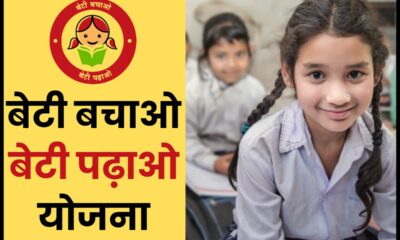
 Education3 months ago
Education3 months agoEmpowering the Future: The Success of Beti Bachao Beti Padhao in Girls’ Education
-

 Knowledge3 months ago
Knowledge3 months agoIs Students’ Data in Safe Hands in a Digital World?
-

 Education3 months ago
Education3 months agoCentral Government Sets New Framework for Coaching Centres
-
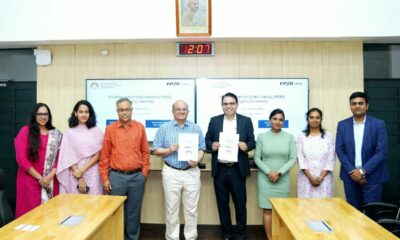
 Education3 weeks ago
Education3 weeks agoFPSB India and IIM Bangalore Forge Strategic Partnership to Advance Financial Education
-

 Education2 months ago
Education2 months agoRadio Broadcasting in Schools: Creating a Platform for Student Voices
-

 Education3 months ago
Education3 months agoIndia to recognise Farsi as a classical language under New Education Policy
-

 Education2 months ago
Education2 months agoKerala Introduces ‘Water-Bell’ Initiative in Schools to Boost Hydration




